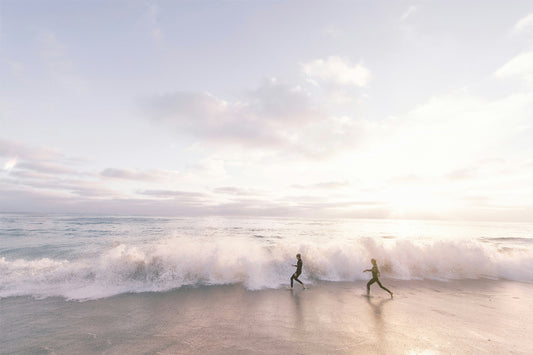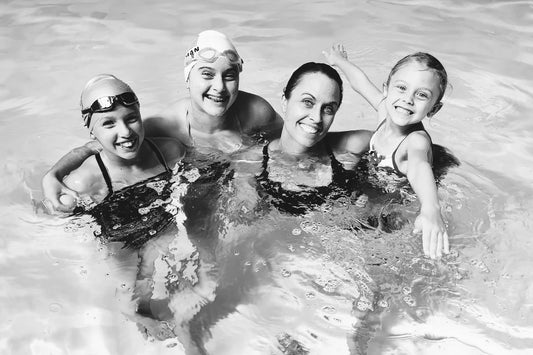Swimming is one of the most enjoyable ways to stay fit and have fun, but knowing swimming safety from the start is important.
Whether you’re swimming in a pool or open water, being informed and prepared makes all the difference.
This blog will cover the essential swimming safety tips every beginner needs to know to ensure a secure learning experience.
Table of Contents
- Learning to Swim: Start with Proper Instruction
- Essential Swim Gear for Safety
- Pool vs. Open Water: Know the Safety Differences
- Basic Water Safety Rules All Beginners Should Know
- How to Avoid Fatigue and Stay Energized While Swimming
- The Importance of Supervision for Beginners
- Recognising and Preventing Drowning Hazards
- Safe Swimming Techniques for New Swimmers
- Conclusion
- Frequently Asked Questions
Learning to Swim: Start with Proper Instruction
The best first step for any beginner learning to swim is professional instruction. A trained instructor ensures that beginners learn correct techniques, build confidence, and understand the basics of swimming safety.
Classes often follow a structured approach, helping learners progress step-by-step while minimising risks.
Essential Swim Gear for Safety
Having the right swimming safety gear is crucial. Here’s what you need.
- Swim Cap: Keeps hair out of the way and enhances visibility
- Goggles: Protect eyes from chlorine and improve underwater visibility
- Floatation Devices: Flotation devices are essential water safety devices for novice swimmers that aid beginners in staying afloat while building strength
- Ear Protection: When spending time in pools or natural water bodies, it's crucial to follow best practices for keeping your ears safe from water infections.
Earplugs and ear sprays can prevent infections, especially during prolonged swims
These beginner swimming safety tips ensure you have the essentials for a secure swimming experience.
Read this if you want a detailed guide on how to choose the right swim gear for your child.
Pool vs. Open Water: Know the Safety Differences
About 4.2 million people in England swim biweekly. Knowing whether to swim in a pool or open water helps prepare them for different conditions and risks.
Pools
Pools offer a controlled environment with lifeguards and clear visibility, making them ideal for beginners to learn and practice swimming.
The consistent water temperature and lack of currents provide a safe and predictable setting for swimmers to develop their skills without worrying about external factors.
Additionally, the presence of lifeguards ensures immediate assistance in case of any emergencies, providing a sense of security for both swimmers and parents.
Swimmers have to follow pool rules for beginners to avoid accidents.
Learn about the safety differences between pool and open-water swimming to help you prepare and protect yourself in any swimming environment.
Open water Swimming
Open water swimming for beginners presents unique challenges compared to pool swimming.
Factors like currents and varying water temperatures can impact a swimmer's performance and safety.
Currents can pull swimmers off course or create unexpected challenges, while changes in water temperature can affect buoyancy and endurance.
If you are a beginner to open water swimming, make sure you are wearing wetsuits and following all the safety tips.
Before diving into natural waters, make sure you read our wild swimming safety guidelines for a secure and enjoyable experience.
Basic Water Safety Rules All Beginners Should Know
If you are just starting out, staying in safe swimming environments is the key to preventing accidents. Follow these rules for a secure learning experience.
- Follow Pool Rules: Make sure you are familiar with the pool rules for beginner swimmers
- Never Swim Alone: Always swim with others, especially in open water
- Stay Hydrated: Swimming can be exhausting; always keep water handy
- Learn Safe Entry: Enter water feet-first unless in designated dive areas
If your child is new to swimming, our comprehensive guide for teaching kids to swim safely provides everything you need to know to make learning fun and stress-free.
How to Avoid Fatigue and Stay Energized While Swimming
Fatigue is a common risk, especially for beginners. Learning how to stay safe in the pool involves understanding your limits and resting before exhaustion sets in.
- Take Breaks: Avoid fatigue by taking regular breaks to rest
- Floatation Aids: Use floatation devices for beginners to help keep afloat when tired
- Breathing Techniques: Proper breathing is an essential part of safe swimming techniques. It helps you stay relaxed and conserve energy
The Importance of Supervision for Beginners
Supervision is critical for all beginners, ensuring someone is available to assist in emergencies.
Lifeguards and trained supervisors are key to maintaining safe swimming environments in pools and open water.
Supervision in open water settings helps mitigate risks related to currents, tides, and other unpredictable conditions.
If your child is hesitant in the water, these tips for overcoming their fear of water can help build their confidence gradually.
Recognising and Preventing Drowning Hazards
Drowning is one of the most serious risks for beginners. To prevent drowning during swimming lessons, make sure you follow these.
- Stay Within Depth Limits: Always swim in areas appropriate for your skill level
- Understand Signs of Distress: Recognise the common signs of a swimmer in trouble
- Use Safety Gear: Proper swimming safety gear such as life vests can be lifesaving
Learning about water safety rules for novice swimmers helps new swimmers stay alert and prevent potential hazards.
Safe Swimming Techniques for New Swimmers
Adopting safe swimming techniques ensures a comfortable and secure experience.
-
Start Slow: Always begin with gentle strokes and progress gradually
-
Focus on Floating: If you are a beginner learning to swim, floating is a core skill that helps build confidence
- Use Buoyancy Aids: Keep floatation devices handy to support your swimming practice
Conclusion
Understanding swimming safety is essential for beginners to enjoy the water confidently.
Being prepared is key, from choosing the right gear to understanding the differences between pools and open water.
Always follow safety rules, use appropriate swimming safety gear, and seek supervision when necessary.
Additionally, here’s our list of the best family-friendly swimming pools in the UK to ensure a safe and fun experience in the water.
Frequently Asked Questions
- What are the basic swimming safety rules?
Basic swimming safety rules include always swimming with supervision, avoiding rough play, understanding your limits, and knowing how to enter the water safely.
Beginners should also follow all pool rules for beginner swimmers, such as walking instead of running near the pool and using floatation devices when needed.
- What should beginner swimmers know about water safety?
Beginner swimmers need to understand water safety for novice swimmers. This includes staying within designated swimming areas, being aware of their abilities, and always swimming with a buddy.
Learning basic safe swimming techniques, such as floating and treading water, helps build confidence and ensures safety.
- How can beginners avoid swimming accidents?
To avoid accidents, beginners should follow beginner swimming safety tips, such as taking breaks to avoid fatigue, staying hydrated, and using appropriate safety gear.
Learning to stay calm in challenging situations and practising safe swimming techniques are also important.
- What swim gear is essential for safety?
Essential swimming safety gear includes goggles to protect the eyes, swim caps for better visibility, floatation devices for support, and earplugs to prevent ear infections.
For open water swimming for beginners, additional gear like wetsuits and swim buoys is also crucial for safety.




